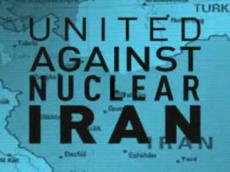|
|
TODAY.AZ / World news
'Iran can be totally isolated from rest of the world'
18 October 2012 [11:41] - TODAY.AZ
 If the Iranian regime does not change course, the economic pressure on it will become so great that it will be totally isolated from the rest of the world in every industry, UANI (United Against Nuclear Iran group) Communications Director Nathan Carleton told Trend.
If the Iranian regime does not change course, the economic pressure on it will become so great that it will be totally isolated from the rest of the world in every industry, UANI (United Against Nuclear Iran group) Communications Director Nathan Carleton told Trend."The global economy today is such that any industry inside a nation is dependent on other nations," the source said, speaking of Iran becoming self-sufficient in many spheres for the last several years.
The EU has imposed new sanctions on Iran a few days ago, this time in the banking sector, industry and shipping - all to increase pressure over the country's disputed nuclear program, which Tehran says is peaceful.
More than 30 entities were added to the sanctions list. The EU journal said the restrictions apply to the National Iranian Oil Company and 25 subsidiaries, the National Iranian Gas Company, the National Iranian Oil Refining and Distribution Company, and the National Iranian Tanker Company.
Some of the companies have offices abroad, including in Britain and Switzerland, the EU said.
Iran in turn called the sanctions "inhuman and illegal", noting that the nation cannot be forced to "surrender and retreat", according to Islamic Republic' FM spokesman Ramin Mehmanparast.
Nathan Carleton told Trend that the Iranian regime can choose whether it wants to go down the road of complete isolation, or whether it wants to stop pursuing a nuclear weapon.
"We believe, that Iran is a great country that wants to be modern and have ties to the West, and might not choose to be the next North Korea," Carleton said.
Carleton said that UANI's strategy is to force the Iranian regime to choose between a nuclear weapon or a formidable economy, and see "if they might go with the latter".
Last week Reuters reported that despite the fact that the U.S. sanctions on Iran do not affect such spheres as medicine and foodstuffs, the Islamic Republic still experiences difficulties with food imports.
The U.S. State Department spokeswoman Victoria Nuland, following the new sanctions imposed by the EU, said the U.S. welcomes such move.
When asked if the U.S. had any argument with the Iranian people, who today are suffering from the sanctions, high prices, inflation and imports, Nuland noted that the U.S. sanctions policy is clear, as there are exceptions.
"The U.S. still exports foodstuffs and medicine to Iran, and we don't preclude or ask anybody else to stop those kinds of imports. So we are not looking to hurt the Iranian people," Nuland noted.
"We do not have any beef with the Iranian people. We do have serious concerns about the choices that their government has made, and the Iranian people have to understand that the choices their government has made have consequences," she added.
UANI's Nathan Carleton said that the sanctions and international pressure against Iran have in fact affected all shipments.
"It has become increasingly more difficult for Iran to do business with anyone," he said. "Unfortunately, it is the people of Iran who are suffering for the regime's actions."
Iran says its nuclear energy program is totally civilian and aimed at power generation adding it needs the 20-percent-enriched uranium it produces for production of fuel for a reactor that produces medicine for cancer and other patients.
/Trend/
URL: http://www.today.az/news/regions/114000.html
 Print version
Print version
Views: 1224
Connect with us. Get latest news and updates.
See Also
- 06 August 2025 [09:00]
Google considers buying Korean satellite images with blurred sensitive sites - 06 August 2025 [08:00]
ChatGPT encourages users to take breaks from AI - 05 August 2025 [21:50]
Japan and South Korea hit record-breaking heat wave - 05 August 2025 [21:23]
ExxonMobil to resume Libya operations after 10 years - 05 August 2025 [20:21]
Apple and Synchrony unveil groundbreaking neural interface - 05 August 2025 [19:36]
Sweden prepares for major shift in energy policy - 05 August 2025 [13:12]
Kashmir’s longest siege: five years of silence, suffering, and struggle - 05 August 2025 [09:00]
Unique McLaren F1 can beat its own record - 05 August 2025 [08:00]
China to release film about Japan's biolabs - 04 August 2025 [22:25]
Sri Lanka introduces inaugural skills training program for inmates
Most Popular
 Kazakhstan is betting on Baku-Tbilisi-Ceyhan
Kazakhstan is betting on Baku-Tbilisi-Ceyhan
 New details surface about Washington meeting between Baku and Yerevan
New details surface about Washington meeting between Baku and Yerevan
 Ukraine prepares for Erdogan’s visit amid push to ratify free trade agreement
Ukraine prepares for Erdogan’s visit amid push to ratify free trade agreement
 Baku, Yerevan set for Washington talks amid hopes for imminent peace deal
Baku, Yerevan set for Washington talks amid hopes for imminent peace deal
 Armed attack targets Syrian interim forces in As-Suwayda
Armed attack targets Syrian interim forces in As-Suwayda
 Heat-related death toll rises to 19 amid extreme heat wave in South Korea
Heat-related death toll rises to 19 amid extreme heat wave in South Korea
 S Africa arrests 1,000 illegal miners
S Africa arrests 1,000 illegal miners
